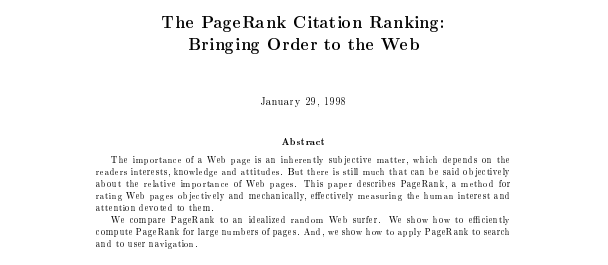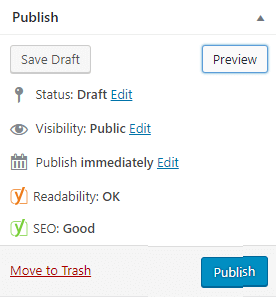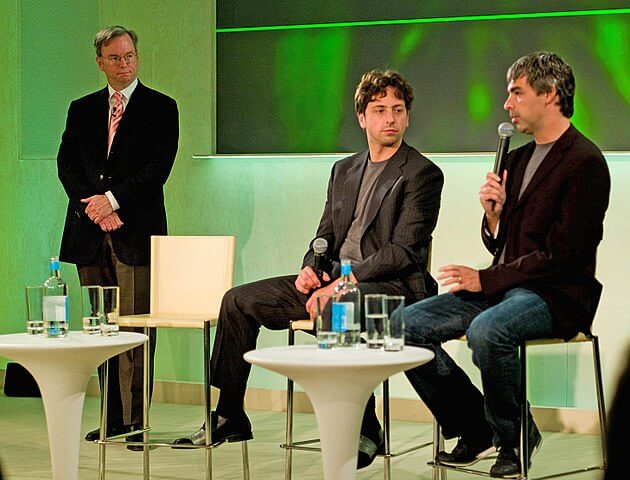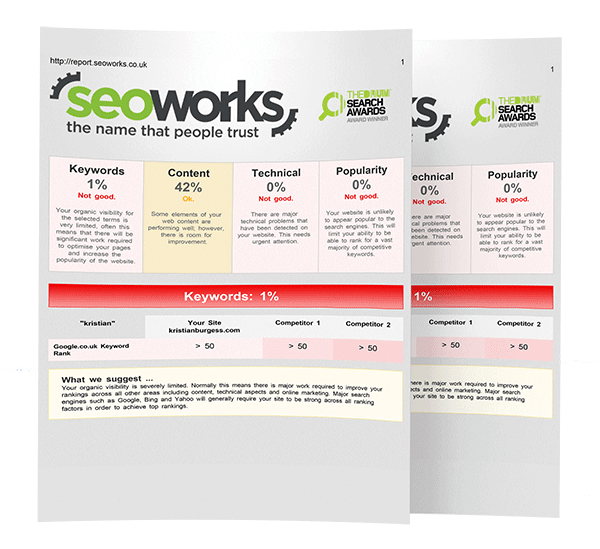Why SEOs Need To Understand Google’s Mission
The failings of many an SEO can be explained like this – they don’t know what Google is really trying to achieve. And what’s worse is it that if they did know, they wouldn’t like it.
If you don’t think about what Google is trying to do as an organisation, then you are at a real disadvantage. Because if you’re in the business of search engine marketing, then you need to understand Google. You need to understand Google really well. The whole SEO industry is fundamentally about understanding Google.
Of course, most SEOs have some tactics and some techniques to help the average website rank a bit better. But few really consider things from the perspective of Google as an organisation – a hugely powerful organisation, at that. So that’s what this post is about: understanding Google’s purpose on a deeper level, to make you more effective at SEO.
The fact is that Google, like any other business, has a mission. And if you want to succeed, it will help you to be familiar with it. Because if you’re in the dark about the ideology that drives Google, then you’re probably not aligned, and there’s a good chance that you’re working at cross-purposes with them. If you don’t understand Google’s mission, you could be trying (and inevitably failing) to work against them, without even knowing it. And that’s definitely not going to help your SEO efforts.
So how do you get to understand Google? Well, you need to take a look at their founding principles, core research, and fundamental mission statement. It involves a little digging, but it’s not too hard to get under the surface. That’s what we’re going to do now.

Google’s Mission
Have you ever considered what Google’s mission is? A lot of SEOs complain that Google is secretive about its inner workings. But their mission statement is out there for anyone to see – and it’s actually quite simple. Here it is:
“Google’s mission is to organize the world’s information and make it universally accessible and useful”
Have you ever thought about it that way before? Google’s aim is about finding the most useful information possible and presenting it to its users. The reason why you, and billions of other people in the world choose to use it every day, is because Google does a better job of organising information and making it accessible than anyone else. They provide the information you want. A combination of this and brilliant design means that and the user experience their search engine offers completely outstrips all opposition.
So how does Google find the best information out there? As you can imagine, it’s not a simple task. But looking at the origins of Google’s ranking algorithm teaches us something vital about the foundations of Google’s thinking – and can help you to align with them.
The original model of PageRank – a way of ranking pages which took its name from Larry Page – was actually built on the same principle as academic citations. You can read about it in Google co-founders Sergey Brin and Larry Page’s early research papers, in which they talk about the first iteration of Google. It’s quite an interesting read (if you’re an SEO nerd).

Brin and Page put is this way: “one can simply think of every link as being like an academic citation.” What does that mean, exactly? Well, this might seem theoretical, and it’s not something SEOs usually think about – but if you want to get into the minds of Google’s founder, then stay with me.
In academic research, the importance of articles and journals are measured primarily by citations. If a journal, and the articles in it, get more citations, then it’s a sign that what’s being said is worthy of comment by other academics. It is then assumed that because the content was worthy of being mentioned, it is important. Because academia is fundamentally about discovering and sharing the best and most relevant information, this made it a good model for search engines. Links, like citations, are key signals to indicate the location of a source of important information. That’s the foundational idea behind PageRank – and it’s arguably the fundamental premise behind how Google achieves it mission. Worth knowing, right?
Bringing Order to the Internet
The problem is, although Brin and Page’s academic citation idea is quite elegant, they’ve always known that it doesn’t completely work.
There’s a big difference between academic publishing and online publishing. The barrier for entry for most academic journals is extremely high. Without a Master’s degree (at the minimum), it’s almost impossible to publish in an academic journal. Respectable academic journals are very exclusive and maintain high editorial standards. This means that the overall quality of information published in academic journals is pretty high.
The internet isn’t quite the same. Anyone with an internet connection and a WordPress account can publish online. Coming from this perspective, you can understand why former CEO of Google Eric Schmidt described the internet as a “cesspool”. In an environment where anyone can publish anything, and anyone can link to anything, things can get messy.

And guess what? This mess is made even worse by individuals and companies who try to get certain websites to the top by exploiting weaknesses in Google’s algorithms.
That’s right. There are a lot of SEOs out there who are causing Google a royal pain in the butt. You don’t want to be that person – it’s not going to help you. And that’s exactly why you need to see things from Google’s perspective.
The Problem With SEO and Commercial Websites
Since the earliest days of the internet, commercial websites have posed a challenge for search engines.
And when I say commercial websites, that means most websites – probably including yours, and your clients.
As Brin and Page put it in one of their foundational research papers, “commercial manipulation is causing search engines a great deal of trouble.”

Little has changed since then. Businesses and SEOs every day do their best to say “hey Google, look at me!”. The difference between the early days of the internet and now is that Google has become a lot better today at ignoring your efforts. In fact, Google has consistently poured resources into being better at ignoring you.
Why? Because most people’s attempts to rank do not help Google to achieve their mission.
The problem is that most people who create websites and promote them are biased. As Brin and Page point out, “many web page authors would simply claim that their pages were all the best and most used on the web.”
But the fact is that the vast majority of content on the web is low quality. Google is constantly getting better at letting that low-quality content sink to the bottom, and it’s increasingly difficult to fight against it.
In 2008, Google CEO Eric Schmidt made an interesting remark about websites that want to look appealing to Google’s algorithms. His comment? “We don’t actually want you to be successful.” He didn’t mean that he didn’t want peoples’ businesses to succeed. He just meant that he didn’t want them to be successful in their attempts to manipulate Google.

When you think about the reasons behind Schmidt’s comment, it makes a lot of sense. Because, believe it or not, Google’s aim isn’t to help your business – or to help any business for that matter. So what can you do? We’ll get to that. But before we do, let’s talk a bit more about links – the foundation of Google’s search engine, and the downfall of many SEOs.
Google’s Mission And The Problem With Links
A lot of the time, link-building campaigns sort of mess up the internet for everyone. The idea of PageRank is actually quite a wonderful thing. Wouldn’t it be great if users of the internet democratically organised the information on the internet by linking only to the best content so others can find it? But it doesn’t work like that. Because whole industries have emerged to manufacture links for websites that don’t deserve them.
However, it’s got to be said that Google hasn’t always helped itself. Let’s not forget that Google once offered a PageRank score plugin, that allowed anyone to see the “score” that Google gave to any page on the web. It didn’t take long for people to cotton on and start exploiting this key tidbit of information. It wasn’t long before buying and selling links became mainstream.

These days, Google maintain that they have no single metric per se to measure the value of a page. But there are other metrics out there. Today, people buy and sell links based on the domain authority of a website – the higher a domain, the more expensive the link. Advanced SEOer know that metrics like Moz’s DA and PA, Majestic’s TF and CF, and Ahrefs DR and CR are only indicators, and don’t always reveal a site’s true strength. But these numbers still point towards a fundamental truth.
What is that fundamental truth? It’s that despite Google’s ever-improving algorithms, the old PageRank algorithm and the way it uses links remains very important to how Google works. As anyone who has ever worked in SEO knows, ranking for anything without backlinks pointing to your page has always been difficult. And as the internet gets more and more saturated with content, it’s getting harder. The brutal injustice of it all is that even if you have the best content, you won’t necessarily rank.
So what do Google say about it? Take a guess. You might be surprised. But if you’ve been paying attention, you shouldn’t be. Because we know that Google doesn’t like websites that try to trick it. And that’s why Google’s official guidelines on link acquisition are super strict. Here’s the first line:
“Any links intended to manipulate PageRank or a site’s ranking in Google search results may be considered part of a link scheme and a violation of Google’s Webmaster Guidelines.”
Yep, you read that right. Any links intended to manipulate (read: improve) PageRank, may be considered a violation of Google’s Webmaster Guidelines. Pretty strong words. So if you can’t go out building links – what can you do?
Aligning Your SEO Strategy With Google’s Mission
Many SEOs obsess over scraps of information that Google representatives reveal, once in a blue moon, about how Google works. The tragic thing about this desperate attempt to squeeze out more information from Google employees is that Google has already published almost everything that anyone needs to know about SEO, in documents such as their SEO Starter Guide. They’re not about to drop some golden bullet, because there isn’t one.

So what’s the solution?
This is the part where you’re probably looking for 100 actionable tips, or some sort of regurgitated description of Google’s guidelines. Many have already been written, and you’ve probably read a few of them. Sites like Ahrefs, Moz, and Yoast can provide you with endless content on SEO tactics that you can implement. And following their guides will certainly help you.
There are hundreds, if not thousands of tactics that can benefit a website and help it perform better in search. But if you’re not aligned with what Google is trying to do in the first place, you’re going to struggle.
Some SEOs talk about Google like they’re an adversary – as if Google is every day trying to frustrate their efforts to rank. The fact is that Google is offering world-changing services to hundreds of millions of searchers every day, for free. Their offering is getting better every day, and they are growing year on year.
The question is, can you align yourself with Google’s mission? Because if not, then you’re in for a struggle.

Michael is an Account Director at the SEO Works. With a background in publishing and content marketing, he helps clients create content that drives traffic, conversions, and growth.

